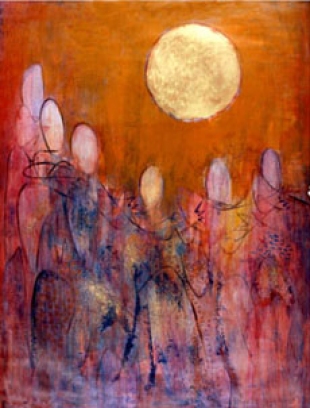We have some 21-day e-courses designed to help you break a habit: Beating the Blahs, Dealing with Disappointment, Fear Busters, Living with Uncertainty, Working with Worry, and some others. Without seeing the course content in advance, people sign up, we assume, for the course that deals with the issue most prevalent in their lives. One of the most popular courses is Beating the Blahs.
The blahs consist of feelings of inertia, depression, listlessness, and despair. Some talk about how worries about the state of the world have sapped their energy and confidence. Others feel beaten down by the terrible economy, job insecurity, the housing crises, and disappearing retirement funds. Younger people are anxious about the future and bummed out by all the gloom and doom voiced by their elders. They desperately want some good old-fashioned hope.
Scott Russell Sanders, one of our favorite essayists, points out that the Latin word for hope, sperare, comes from the Indo-European root spei, which means to expand. "To be hopeful is not only to feel expansive, but to count on an ever-flowing bounty while to feel despair is to feel constrained, to fear that the springs of life are drying up."
Hope is an orientation of the heart, a renewable energy source that comes from the grace of God. It never runs out. We can tap into it whenever it is needed. Martin Luther said about this positive force in our lives: "Everything that is done in the world is done by hope."
To remind us of this truth, we have been blessed with inspiring saints and heroes who kept on keeping on in the face of seemingly insurmountable odds — Mohandas Gandhi, Dr. Martin Luther King, Jr., Nelson Mandela, Desmond Tutu, Dorothy Day, Daniel Berrigan, and many others. Our spirits are also expanded by those who regularly face darkness and do not allow it to overtake them — health care and hospice workers, volunteers in international humanitarian programs, human rights advocates, and people working for social justice in areas of conflict around the globe. All of these people, in the words of Ghanian theologian Mercy Amba Oduyoye, "wear hope like a skin."
This potent human faculty can help us battle the blahs. We can practice hope in our daily lives as an antidote to despair and inertia. Here's how:
- Use affirmations to express your yearning for a better world. For example, "All things work together for good for those who love God." "Even though I walk through the darkest valley, you are with me." Try one of these hope boosters for a week, repeating it while you are walking, waiting in line, or at the beginning and end of a prayer session. See how the affirmation affects your mood and gives intention to your daily activities.
- Set aside a meal with your family or friends to talk about the people who have brought hope into your lives. Give thanks to God for their testimonies and than identify one place in your community where you can serve as a bearer of hope.
- Another favorite writer of ours is the thirteenth century mystic Jelalludin Rumi. In one verse, he advised: "Start a huge foolish project like Noah. It makes absolutely no difference what people think of you." Sometimes we hold back because we think that our hopeful enthusiasm will seem out of place in our cynical and downbeat world. Resist that attitude. Initiate a bold project that will benefit others and give the next generation reason to hope.
Finally, hope is nourished by patience. We live in times when this virtue is in short supply, but without it, we quickly despair. With patience, we can tolerate delays and allow events to unfold in their own time. We can wait for the right moment and not be afraid to start over again if things don’t work out the first time.
Deep down in our hearts, our hope is based on the firm and unshakable faith that all is well and will continue to be well. Nothing can shatter our expansiveness.
